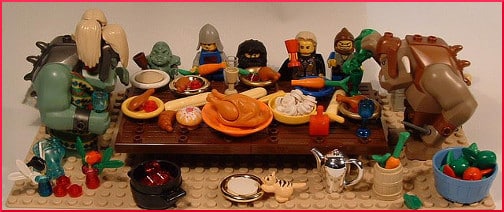A few days from now, many Americans will face an annual celebratory gathering of family and/or friends that should be pure pleasure. Instead, Thanksgiving too often provides traumatic difficulties for anyone who wants to exercise sovereignty over substance intake. The issues around food can be enormous. The temptation to drink too much is a separate but potentially related problem, because that much relaxation can impair judgment.
As Childhood Obesity News previously mentioned, Alex Brecher is a lap-band surgery patient who lost more than 100 pounds ten years ago without regaining weight in the interim. One reason for his success is a canny expertise in the area of fatlogic, the wacky philosophy cobbled together from often-absurd excuses for counterproductive and self-defeating behavior. He offers practical suggestions to meet holiday challenges.
He advises people to abandon the “I only get to eat this once a year” fallacy. When a cousin says “Aunt Hilda makes a bacon and pumpkin pie to die for,” it could be literally true. Not that the pie alone would be responsible, but it could provide the tiny push that sends a weight-conscious person careening down a slippery slope.
Maybe Aunt Hilda says, “I made it just for you, because I remembered how much you liked it last year.” You don’t want to offend anybody, and you don’t want your spurning of the pie to become the topic of family gossip throughout the new year. Is it possible to talk your way out of this trap?
You want to acknowledge how special the treat is, and how much you appreciate the work that went into making it, and the cook’s thoughtfulness in remembering your fondness for it. “I really look forward to having some later” is a ploy that might work. Here is a brilliantly flattering suggestion from Brecher:
Thanks, but I can’t eat that any more. The sugar could make me sick, and I’d rather stay healthy and get to spend the afternoon with you instead of in bed.
Or just blame a professional. “Oh, bummer! Pie is on my no-go list, and my doctor hooks me up to a lie detector every appointment. I’d never get away with it.” The important thing to remember is, it’s okay to say no. In some cases, it’s also okay to have one (1) slice of Aunt Hilda’s bacon and pumpkin pie. As Brecher says:
Serve yourself one small portion, and savor every bite. Think about the taste of the food, how it feels in your mouth, and what memories it brings to mind. Then think about how good it feels to be in control of yourself… Even if you only get the chance to eat the dish once a year, you’re not going to make it last any longer by cramming in more servings.
Dr. J. Renae Norton, who treats eating disorders, also offers holiday survival advice. One suggestion is to eat the day’s preliminary meals as usual, rather than skipping breakfast and/or lunch in favor of the large dinner. If the special meal you plan to attend is a pot-luck, bring something on your own list of acceptable foods. That way, you will be sure there is at least one thing you can enjoy without repercussions.
For anyone who belongs to a support group, or who has a good friend also caught in the same family-awkwardness dilemma, role-playing can be a tremendous help. Take turns acting the part of Aunt Hilda and the guest who will refuse all dangerous foods. Practice saying no with perfect politeness and implacable firmness. And if all else fails, bail. Dr. Norton says:
Have an “emergency plan” in case you find yourself in a stressful situation. Get some fresh air, go to another room and practice some relaxation or deep breathing exercises, arrange for a close friend to be “on-call” in case you need someone to talk to.
Your responses and feedback are welcome!
Source: ““I’m Cleaning My Plate Because Children Are Starving in Africa…” and Other Terrible Excuses to Overeat,” BariatricPal.com, 10/23/14
Source: “Eating Disorder Treatment: Tips to Reduce Stress During the Holiday Season,”
EatingDisorderPro.com, 11/22/13
Image by martha_chapa95


 FAQs and Media Requests:
FAQs and Media Requests: 











